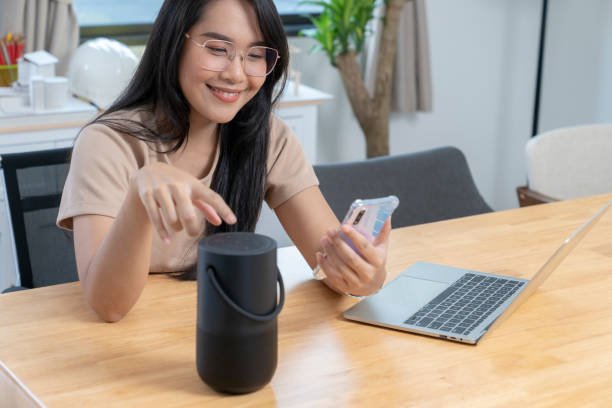What is a voice assistant? Are there many types of voice assistants and which is the best voice assistant?
A voice assistant is a digital assistant that uses voice recognition, natural language processing and other technologies to perform tasks and provide information based on voice commands.
What is a voice assistant? Are there many types of voice assistants and which is the best voice assistant?
Voice assistants
A voice assistant is a digital assistant that uses voice recognition, natural language processing and other technologies to perform tasks and provide information based on voice commands.
These assistants are designed to make human computer interactions more intuitive and user friendly. Users can communicate with voice assistants through spoken commands and the assistant responds by performing tasks, answering questions or providing information.
Types of voice assistants
1. Smart Speaker and Home Assistant
These voice assistants are integrated into smart speakers or home devices such as Amazon Echo (Alexa) Google Home (Google Assistant) and Apple HomePod (Siri). They can control smart home devices, play music, answer questions and perform various tasks.
2. Virtual personal assistants
Virtual personal assistants found on smartphones and other devices include Apple's Siri Google Assistant and Samsung's Bixby. These assistants help users with tasks like setting reminders, sending messages, making calls and accessing information.
3. Voice Assistant in Car
Many modern cars come equipped with voice assistants such as Amazon Alexa Google Assistant or proprietary systems developed by automakers. These systems help drivers control navigation music and other features handsfree.
4. Enterprise Voice Assistant
Designed for business use, enterprise voice assistants like Microsoft's Cortana or IBM's Watson Assistant help streamline tasks within organizations. They can assist with scheduling data retrieval and other work related tasks.
5. Special Voice Assistant
Some voice assistants are designed for specific purposes such as health care or customer service. These may include specialized language models designed to understand and answer industry specific questions.
Best Voice Assistant
Determining the "best" voice assistant depends on a variety of factors including user preferences, device compatibility and specific use cases. Here's an overview of the three major voice assistants and their powers
1. Amazon Alexa
Strengths
1. Extensive smart home integration Alexa works seamlessly with a wide range of smart home devices.
2. Broad skill set Alexa's skills cover a variety of tasks from entertainment to productivity.
3. Larger third party ecosystem Developers can create third party skills to extend Alexa's functionality.
Idea
1. Natural language processing can sometimes be less robust than competitors.
2. Privacy concerns have been raised regarding voice recording.
2. Google Assistant
Strengths
1. Exceptional natural language processing Google Assistant excels at understanding context and providing accurate responses.
2. Integration with Google services seamless connectivity with Gmail Google Calendar and other Google applications.
3. Wide device compatibility Available on a variety of devices including Android smartphones and smart speakers.
Idea
1. May collect and use significant amounts of user data for personalized services.
2. The ecosystem may be more fragmented than Apple's Siri.
3. Apple Siri
Strengths
1. Deep integration with the Apple ecosystem Siri works seamlessly across Apple devices including iPhones iPads Macs and HomePod.
2. Emphasis on privacy Apple emphasizes user privacy and Siri processes many requests on the device.
3. Natural language understanding Siri is adept at understanding spoken language.
Idea
1. Limited third party app integration compared to Alexa and Google Assistant.
2. Siri capabilities may vary in some regions.
Choosing the right voice assistant
Choosing the best voice assistant depends on personal preferences, device compatibility and desired functionality. Consider the following factors when making a decision
1. Device Ecosystem
If you primarily use devices from a specific brand (Amazon, Google or Apple) the corresponding voice assistant may offer the best integration within that ecosystem.
2. Use Cases
Different voice assistants excel at different tasks. Evaluate which assistant matches your most common use cases whether it's smart home control productivity or entertainment.
3. Privacy Concerns
Some users prefer privacy. For example Apple Siri processes many requests on the device with an emphasis on user data security.
4. Natural Language Processing
Consider the voice assistant's natural language processing capabilities especially if you prefer conversational conversations.
5. ThirdParty Integration
Assess the availability of third party skills or apps that extend the voice assistant's functionality based on your needs.
Conclusion
the "best" voice assistant is subjective and depends on the user's preferences and needs. Each major voice assistant has its own strengths and considerations so users should choose based on their personal preferences and the devices they commonly use.
What's Your Reaction?




















